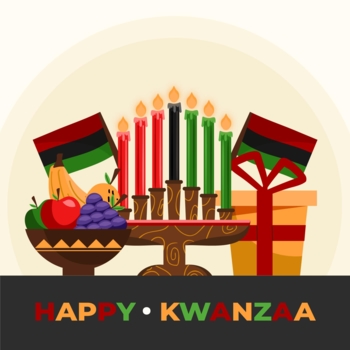 Kwanzaa is a week-long celebration of African-American culture and heritage that takes place from December 26th to January 1st. Dr. Maulana Karenga, a professor of Africana Studies, first introduced it in 1966 as a way to respect and advance African culture and community values. While some may view it as a secular holiday, many Christians oppose Kwanzaa for a variety of reasons. The origins of Kwanzaa can be traced back to the civil rights movement of the 1960s. During this time, African-Americans were fighting for equality and recognition of their culture and history. Kwanzaa was created as a way to celebrate and uplift the unique traditions and customs of African heritage.
Kwanzaa is a week-long celebration of African-American culture and heritage that takes place from December 26th to January 1st. Dr. Maulana Karenga, a professor of Africana Studies, first introduced it in 1966 as a way to respect and advance African culture and community values. While some may view it as a secular holiday, many Christians oppose Kwanzaa for a variety of reasons. The origins of Kwanzaa can be traced back to the civil rights movement of the 1960s. During this time, African-Americans were fighting for equality and recognition of their culture and history. Kwanzaa was created as a way to celebrate and uplift the unique traditions and customs of African heritage.The name "Kwanzaa" is derived from the Swahili phrase "matunda ya kwanzaa," which means "first fruits of the harvest." This reflects the holiday's focus on celebrating the bounty of the earth, unity, and community. The seven days of Kwanzaa are each dedicated to a different principle, known as the Nguzo Saba.
These principles include unity, self-determination, collective work and responsibility, cooperative economics, purpose, creativity, and faith. Each day, a candle is lit on the Kinara, a candle holder with seven branches that represent the principles. Families and communities gather to reflect on these principles and their significance in their lives.
Despite its noble intentions, Kwanzaa has faced criticism and opposition from the Christian community. One of the main reasons for this is the fact that Kwanzaa is a secular holiday with no religious connections.
For Christians, the holiday season is a time to celebrate the birth of Jesus Christ and his teachings. The lack of religious aspects in Kwanzaa is seen as contradictory to the Christian faith. Christians believe that their faith should be at the center of all celebrations and may view Kwanzaa as a distraction from the true meaning of Christmas.
Another reason for Christian opposition to Kwanzaa is the belief that it promotes a separatist agenda. Kwanzaa celebrates African culture and heritage, and while this is important, some Christians view it as a way to separate African Americans from their Christian identities. Christianity is a central part of African American culture, and Kwanzaa's focus on African traditions may be seen as excluding or denouncing this important aspect of their identity.
Furthermore, some Christians view Kwanzaa as a political statement and a rejection of American traditions. The holiday's principles and celebrations are often seen as conflicting with the values and principles of American society. For example, the principle of collective work and responsibility goes against the ideas of individualism and self-sufficiency that are valued in American culture.
As a result, some Christians view Kwanzaa as un-American and may reject it for this reason. The commercialization of Kwanzaa is another aspect that Christians may oppose. While Kwanzaa was intended to be a non-commercial holiday, it has increasingly become part of the consumer culture of Christmas.
The exchange of gifts, which is a central part of Kwanzaa celebrations, can be seen as conflicting with the Christian belief that Christmas should not be about material possessions. Some Christians also criticize Kwanzaa for its lack of historical accuracy. It is often seen as a made-up holiday with no real roots in African history or traditions.
Some even claim that Dr. Maulana Karenga, the creator of Kwanzaa, was a convicted felon who had a history of violence and was trying to promote a political agenda. While these claims may not be entirely true, they have contributed to the opposition to Kwanzaa by some Christians.
In conclusion, the history of Kwanzaa and why Christians oppose it is complex and multifaceted. While the holiday was created with the intention of celebrating African heritage and promoting unity and community, its secular nature and lack of religious connections have led to criticism and rejection by many Christians.
Additionally, concerns over the holiday's political agenda, separation from Christian identity, and commercialization have further fueled Christian opposition to Kwanzaa. Bottom line: Christians reject Kwanzaa as having anything to do with the Christian celebration of the birth of Christ. This means that Kwanzaa is simply a cultural celebration and has nothing to do with a religious holiday or Christmas.
Your partner,
(c) Apostle Jonas Clark
www.jonasclark.com
-STAY INFORMED
GET THE FREE JONAS CLARK REVOLUTIONARY REVIEW